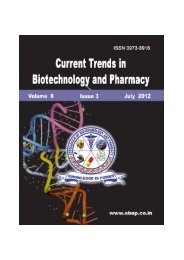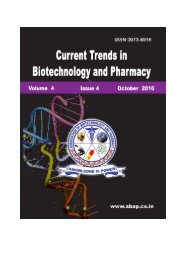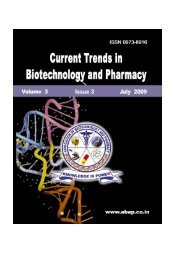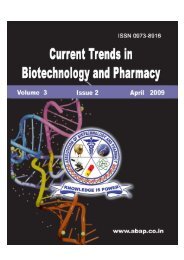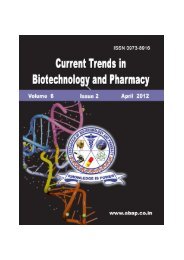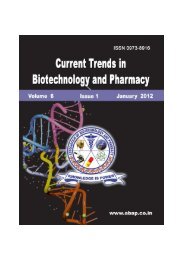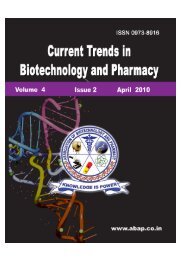full issue - Association of Biotechnology and Pharmacy
full issue - Association of Biotechnology and Pharmacy
full issue - Association of Biotechnology and Pharmacy
Create successful ePaper yourself
Turn your PDF publications into a flip-book with our unique Google optimized e-Paper software.
Current Trends in <strong>Biotechnology</strong> <strong>and</strong> <strong>Pharmacy</strong><br />
Vol. 5 (3) 1346 -1352 July 2011, ISSN 0973-8916 (Print), 2230-7303 (Online)<br />
Effect <strong>of</strong> NPK <strong>and</strong> Farm Yard Manure on the Accumulation <strong>of</strong><br />
Forskolin, an Anti-Obesity Diterpenoid Molecule in Coleus<br />
forskohlii<br />
S. Nageswara Rao, S. Gangadhar Rao, B. Bhargavi <strong>and</strong> K. Janardhan Reddy*<br />
Department <strong>of</strong> Botany, Osmania University, Hyderabad 500 007, India<br />
*For correspondence - kjreddy50@yahoo.co.in<br />
1346<br />
Abstract<br />
Medicinal plants growing in wild cannot<br />
ensure consistent quality due to genetic<br />
variability found in the natural populations,<br />
geographical variations <strong>and</strong> season <strong>of</strong> collection.<br />
Therefore, there is a need to cultivate medicinal<br />
plants using known varieties for extraction <strong>of</strong><br />
high yields <strong>of</strong> active principles. This can be<br />
achieved only with organic farming practices <strong>and</strong><br />
post harvest technologies. The research<br />
conducted by institutes like CIMAP <strong>and</strong> other<br />
CSIR institutes, ICAR <strong>and</strong> Universities has led<br />
to the release <strong>of</strong> a number <strong>of</strong> high yielding<br />
medicinal plant cultivars. Coleus forskohli is a<br />
herb with fleshy, fibrous roots that grows in wild<br />
in the warm, subtropical areas like in India,<br />
Burma, <strong>and</strong> Thail<strong>and</strong>. Coleus forskohlii is being<br />
grown in several parts <strong>of</strong> the country as a<br />
commercial crop. In the present investigation the<br />
effect <strong>of</strong> nitrogen, phosphorus, potassium (NPK)<br />
<strong>and</strong> farm yard manure amendments on the<br />
growth <strong>of</strong> roots <strong>and</strong> accumulation <strong>of</strong> forskolin<br />
was studied. The results revealed that 50% <strong>of</strong><br />
NPK <strong>and</strong> 10 tonnes <strong>of</strong> farm yard manure per<br />
hectare at a harvesting time 150 days are ideal<br />
for maximum yield <strong>of</strong> forskolin.<br />
Key words: Forskolin, Farm Yard Manure, NPK,<br />
Coleus forskohlii<br />
Introduction<br />
Cultivation <strong>of</strong> medicinal plants appears<br />
to be an important strategy for research <strong>and</strong><br />
development. More than 400 plant species used<br />
for production <strong>of</strong> medicines by the Indian<br />
Industry. Cultivation <strong>of</strong> various varieties <strong>of</strong><br />
medicinal plants is important to isolate the active<br />
principles. The application <strong>of</strong> organic farming<br />
practices <strong>and</strong> post harvest technologies can<br />
enhance their yields so that it becomes pr<strong>of</strong>itable<br />
to the farmers. The potential returns to the farmer<br />
from cultivation <strong>of</strong> medicinal plants are reported<br />
to be quite high if fertilizers are used at a proper<br />
dose <strong>and</strong> time. The application <strong>of</strong> bio-fertilizers<br />
in combination with the inorganic fertilizers<br />
substitutes the required quantity <strong>of</strong> the fertilizers<br />
needed by the medicinal <strong>and</strong> aromatic crops. The<br />
bio-fertilizers due to its eco friendliness will<br />
change the phase <strong>of</strong> medicinal <strong>and</strong> aromatic crops<br />
production in the years to come (1). In<br />
Chlorophytum borivallianum, the number <strong>of</strong><br />
tubers, fresh <strong>and</strong> dry tuber yields <strong>and</strong> steroid<br />
content increased with the application <strong>of</strong><br />
vermicompost <strong>of</strong> 5 tonnes ha -1 (2).<br />
When Coleus forskohli was grown in FYM<br />
amended soil with Paecilomyces lilacinus, there<br />
was better root development due to control <strong>of</strong><br />
Effect <strong>of</strong> NPK <strong>and</strong> farm yard manure on the accumulation <strong>of</strong> forskolin



